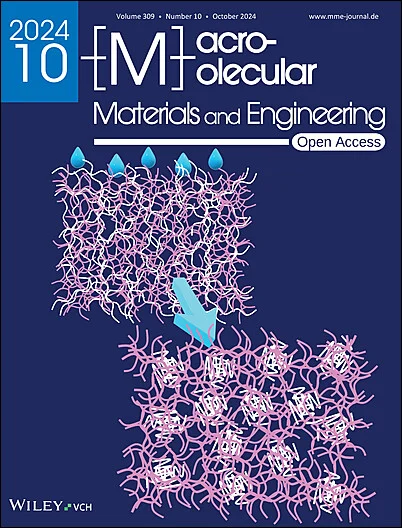利用膜渗透蒸馏和渗透蒸发相结合的方法生产可持续的低酒精啤酒
IF 4.2
3区 材料科学
Q2 MATERIALS SCIENCE, MULTIDISCIPLINARY
引用次数: 0
摘要
在这项工作中,采用膜渗透蒸馏法(OD)对啤酒(酒精含量为 5.2 v/v%)进行部分脱醇,使其乙醇含量降低约 50%,从而得到低醇啤酒。在实现低酒精度和啤酒感官特性之间寻求折中。此外,还研究了膜 OD 过程强化的可行性,这要归功于它与膜渗透(PV)的结合。两个连续的 PV 阶段(一个疏水阶段和另一个亲水阶段)允许生产用于膜 OD 操作的循环水(乙醇含量低于 0.5 wt%)和作为有价值副产品的生物乙醇(99% 乙醇)。本文章由计算机程序翻译,如有差异,请以英文原文为准。

Sustainable Low-Alcohol Beer Production by Combination of Membrane Osmotic Distillation and Pervaporation
Membrane osmotic distillation (OD) is applied in this work for the partial dealcoholization of beer (5.2 v/v% alcohol content) to diminish its ethanol content by around 50% giving rise to a low alcohol beer. A compromise is sought between the low alcoholic degree achieved and beer sensory properties. Moreover, the feasibility of the membrane OD process intensification is studied thanks to its combination with membrane pervaporation (PV). Two successive PV stages, one hydrophobic and the other hydrophilic, allow the production of recycled water (with less than 0.5 wt% ethanol) for the membrane OD operation and bioethanol (99% ethanol) as valuable byproduct.
求助全文
通过发布文献求助,成功后即可免费获取论文全文。
去求助
来源期刊

Macromolecular Materials and Engineering
工程技术-材料科学:综合
CiteScore
7.30
自引率
5.10%
发文量
328
审稿时长
1.6 months
期刊介绍:
Macromolecular Materials and Engineering is the high-quality polymer science journal dedicated to the design, modification, characterization, processing and application of advanced polymeric materials, including membranes, sensors, sustainability, composites, fibers, foams, 3D printing, actuators as well as energy and electronic applications.
Macromolecular Materials and Engineering is among the top journals publishing original research in polymer science.
The journal presents strictly peer-reviewed Research Articles, Reviews, Perspectives and Comments.
ISSN: 1438-7492 (print). 1439-2054 (online).
Readership:Polymer scientists, chemists, physicists, materials scientists, engineers
Abstracting and Indexing Information:
CAS: Chemical Abstracts Service (ACS)
CCR Database (Clarivate Analytics)
Chemical Abstracts Service/SciFinder (ACS)
Chemistry Server Reaction Center (Clarivate Analytics)
ChemWeb (ChemIndustry.com)
Chimica Database (Elsevier)
COMPENDEX (Elsevier)
Current Contents: Physical, Chemical & Earth Sciences (Clarivate Analytics)
Directory of Open Access Journals (DOAJ)
INSPEC (IET)
Journal Citation Reports/Science Edition (Clarivate Analytics)
Materials Science & Engineering Database (ProQuest)
PASCAL Database (INIST/CNRS)
Polymer Library (iSmithers RAPRA)
Reaction Citation Index (Clarivate Analytics)
Science Citation Index (Clarivate Analytics)
Science Citation Index Expanded (Clarivate Analytics)
SciTech Premium Collection (ProQuest)
SCOPUS (Elsevier)
Technology Collection (ProQuest)
Web of Science (Clarivate Analytics)
 求助内容:
求助内容: 应助结果提醒方式:
应助结果提醒方式:


